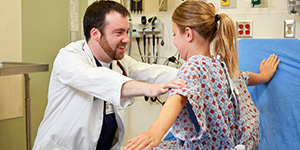Child Protection Program
A comprehensive program for identification, evaluation, and case coordination of children who may have experienced abuse or maltreatment
443-849-STOP (7867)
The GBMC Child Protection Program works with children experiencing various types of maltreatment, including physical abuse, sexual abuse, neglect, human trafficking, and substance-exposed newborns.
Our program is comprised of a multidisciplinary team that includes pediatricians, social workers/CPP interventionists, emergency medicine providers, child life specialists, pediatric nurses, and forensic nurses. Our team is committed to ensuring the safety of every child that visits GBMC.
The Child Protection Program works to:
- Consult on and help coordinate the medical evaluation and treatment of all pediatric patients who reported or are suspected to have experienced abuse, neglect, or maltreatment
- Serve as a liaison between GBMC and government agencies that investigate child abuse, neglect, and human trafficking
- Educate medical providers, families, and community members on the recognition, reporting, prevention, and effects of child abuse, neglect, and human trafficking
Our Services
- Respond to acute/emergent pediatric abuse, neglect, and maltreatment consultations
- Complete assessments for child maltreatment and make mandatory reports with appropriate investigative agencies
- Pre- and post-natal interventions with substance exposed newborns and their families
- Coordinate pediatric sexual abuse and human trafficking patients with the Sexual Assault Forensic Examination (SAFE) team
- Educate parents, medical providers, and the community about child abuse, neglect, maltreatment, and human trafficking
Frequently Asked Questions
What should I do if I suspect child abuse?
- If you suspect any form of child maltreatment, please contact your local Child Protective Services agency or local law enforcement agency to file a report immediately.
- If you think a child is in immediate danger, please contact 911.
If I am a medical provider, what should I do to have my patient further evaluated for child maltreatment?
The GBMC Child Protection Program Coordinator is available Monday through Friday from 8 a.m. to 4 p.m. Please call 443-849-STOP (7867).
During weekends, after business hours, and on holidays, please contact the GBMC Pediatric Emergency Department at 443-849-3900 and ask to speak to the pediatrician on duty.
How common is child abuse?
- Child abuse crosses all socioeconomic and educational levels, religions, and ethnic and cultural groups.
- At least 1 in 7 children have experienced child abuse and/or neglect in the past year, and this is likely an underestimate.
- In 2019, 1,840 children died of abuse and neglect in the United States.
- About 1 in 4 girls and 1 in 13 boys experience child sexual abuse at some point in childhood.
- 91% of child sexual abuse is perpetrated by someone the child or child’s family knows.
References:
https://www.cdc.gov/violenceprevention/childabuseandneglect/fastfact.html
https://www.cdc.gov/violenceprevention/childsexualabuse/fastfact.html
https://americanspcc.org/child-abuse-statistics/
How to Help Your Child
Communication is Key!
Body Rules
- Use correct names for body parts, including genitalia/private parts!
- Teach your kids which parts are private
- Teach your kids about safe and unsafe touches
- Teach your kid about secrets- good versus bad secrets
- Teach your kid what to do if they receive an unsafe touch
- Empower them, by giving them permission to say “no” to any unsafe of uncomfortable touch
- Teach them to “tell, tell, tell”! Who are safe people to tell- make sure you teach them who to tell at home, at school, and who are other safe people
- Monitor you kid’s technology. Monitor their messages, who they are talking to (phone, facetime, through apps, etc.), their social media, and who they are playing games/apps with
Believing your child, is protecting your child.
A believing protective parent/caregiver is one of the most influential factors in a child’s emotional healing from experiencing sexual abuse
Children can (and do!) recover from abuse and live a fulfilled life, without long-term effects
Counseling is available for children experiencing trauma symptoms
- Trauma Focused counseling has been shown to reduce symptoms of PTSD, anxiety, and depression
When children experience a traumatic event, they may have traumatic stress reactions. These reactions may look different for each child. Traumatic stress reactions include:
- uncertainty/fear/anxiety
- change in sleep habits or sleep occurrences (ex: nightmares, bedwetting, etc.)
- difficulty concentrating
- headaches or stomachaches
- withdrawn behavior
- change in behavior or “acting out”
- self harm behaviors
- engaging in high-risk behaviors
* No sign, symptom, or reaction is indicative of abuse. The best indicator of abuse is a child’s abuse disclosure.
Some children may show no traumatic stress reaction and no changes in their behavior/demeanor.
For additional information:
How to Respond if your child tells you they’ve experienced abuse:
- Remain calm, try not to overreact
- Listen
- Be supportive, do not minimize or discount what the child has told you
- Take Action
- Call Child Protective Services, Law Enforcement, your school, your doctor, or call the GBMC Child Protection Program and we can help guide you
- Ensure the child that it’s not their fault!
Resources
Community/Family Resources:
Baltimore County Child Advocacy Center
National Children’s Alliance
Maryland Children’s Alliance
Rape, Abuse and Incest National Network (RAINN)
- 800-656-HOPE (4673)
- www.rainn.org
Kennedy Krieger Institute Center for Child and Family Traumatic Stress
CARE Clinic at University of MD Medical Center
National Center for Missing and Exploited Children
Professional/Medical Resources:
Maryland CHAMP (The Maryland Child Abuse Medical Providers’ Network)
American Professional Society on the Abuse of Children (APSAC)
International Society for the Prevention of Child Abuse and Neglect (ISPCAN)
Child Welfare Information Gateway
Children’s Mercy Child Protector App
American Academy of Pediatrics
Related Services

Domestic Violence at GBMC
6701 N. Charles St. Main Hospital, Emergency Department - Towson, MD 21204

SAFE Program at GBMC - Sexual Assault Forensic Examination
6701 N. Charles St. Main Hospital, Emergency Department - Towson, MD 21204

Emergency & Inpatient - Pediatrics
6701 N. Charles St. Main Hospital - Towson, MD 21204
